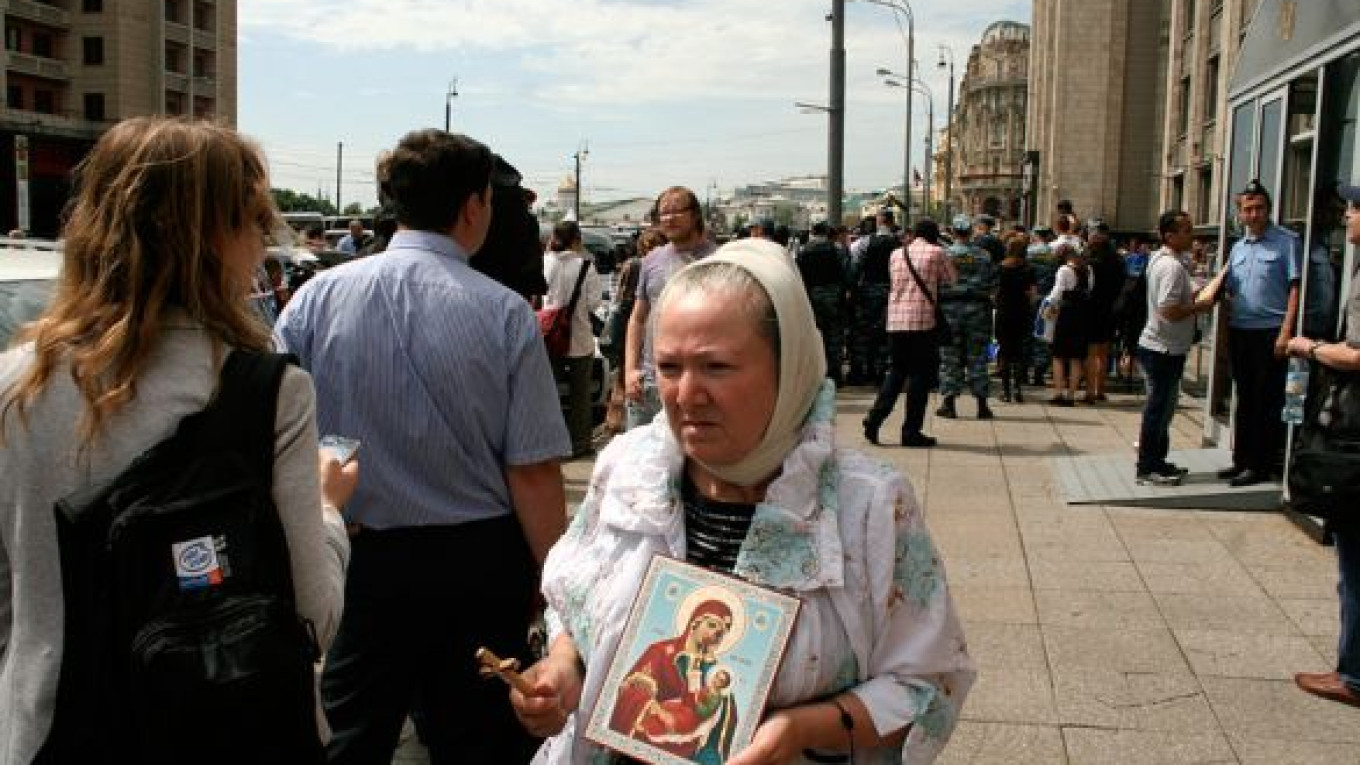The State Duma on Tuesday unanimously passed a bill in a third and final reading that introduced fines and possible prison sentences for offending “feelings of religious believers,” after months of criticism and wrangling over the bill's definitions and potential impact on free speech.
The so-called “blasphemy bill” was introduced last year in the wake of rock group Pussy Riot's “punk prayer” in Christ the Savior Cathedral, a performance that outraged conservative-leaning segments of Russian society. The legislation was met with skepticism from liberals and rights activists who fear that it could be used to target government opponents.
Although drafted last September by deputies from all four Duma factions, the Liberal Democratic Party skipped the final vote, as did a majority of Just Russia and Communist Party factions, making the bill mostly the initiative of United Russia, all 238 of whose faction members supported it. The legislation, which is set to take effect in July, passed Tuesday 276 to 0.
A bill protecting religious sentiment is passed as activists call it a “step back.”
One of the main groups that stands to benefit from the bill, the Russian Orthodox Church, whose leaders have expressed ambivalence toward the legislation, is a major political ally of President Vladimir Putin and United Russia.
Lawmakers have said the bill would promote tolerance toward various religious groups represented in Russia and prevent religious conflicts.
“Actions offending believers' feelings are harmful for the whole society by creating conflict situation within it,” Irina Yarovaya, a United Russia deputy and one of the bill's initiators, said in September, adding that it did not violate the constitutional rights of freedom of religion and belief.
But rights activists say the new law might be used for political purposes, such as to put pressure on the opposition or on free speech, and contradicts constitutional principles.
“It's a step back from the secular nature of Russia recognized by the Constitution,” veteran human rights activist Lev Ponomaryov said Tuesday in comments carried by Interfax. “The bill introduces illegal terms [such as feelings] and may be used in politically motivated charges.”
The new law will punish “actions expressing obvious disrespect toward society and committed to abuse of religious feelings of believers,” with potential punishment of up to three years behind bars, fines of up to 500,000 rubles ($15,430), and compulsory correctional labor.
It also stipulates fines of 80,000-300,000 rubles and a prison term of up to three months for hindering the activities of religious organizations and preventing religious rites from being conducted.
A fine of over 200,000 rubles can be levied for deliberate destruction of religious or theological literature.
The government told the Duma earlier this year to improve the bill, with one result being that the maximum prison term was reduced from five to three years in the final version.
“But the bill's main drawbacks, such as unclear wording, remained,” said Olga Sibiryova, a religion expert with the Sova think tank.
Opponents particularly oppose the use of the term “believers' feelings” in the bill, saying it is too broad, making it possible to interpret the term in different ways.
Kremlin human rights ombudsman Vladimir Lukin said the new law would unfairly separate believers from other categories of society. “A law must guarantee rights for everyone — representatives of all religions, atheists, but not single anyone out,” he told Interfax.
“I wouldn't oppose the law so much, provided it guaranteed freedom of belief for all people. It's important to defend religious feelings, but I do not support hefty punishment,” Lukin said.
On Tuesday, the liberal Yabloko party, which is not represented in the Duma, organized a series of one-person pickets in front of the Duma building to express disagreement with the bill.
Activists held posters that read “The bill defending believers's feelings is inquisition.” Party head Sergei Mitrokhin, who intends to run for Moscow mayor in September, said the bill was aimed at rallying conservative segments of society around the state and at enabling a crackdown against those who don't agree with state policy.
Contact the author at e.kravtsova@imedia.ru
Related articles:
A Message from The Moscow Times:
Dear readers,
We are facing unprecedented challenges. Russia's Prosecutor General's Office has designated The Moscow Times as an "undesirable" organization, criminalizing our work and putting our staff at risk of prosecution. This follows our earlier unjust labeling as a "foreign agent."
These actions are direct attempts to silence independent journalism in Russia. The authorities claim our work "discredits the decisions of the Russian leadership." We see things differently: we strive to provide accurate, unbiased reporting on Russia.
We, the journalists of The Moscow Times, refuse to be silenced. But to continue our work, we need your help.
Your support, no matter how small, makes a world of difference. If you can, please support us monthly starting from just $2. It's quick to set up, and every contribution makes a significant impact.
By supporting The Moscow Times, you're defending open, independent journalism in the face of repression. Thank you for standing with us.
Remind me later.


